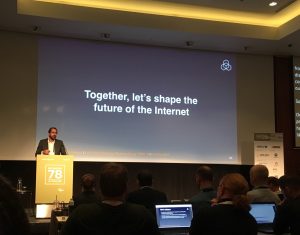Wednesday was all about working groups. Here are some of the highlights from the day.
Address Policy I
- First up was Remco van Mook with a new policy proposal (not yet formally entered into the PDP) on updating the IXP assignment policy. Noteworthy changes include increasing the size of the reserved IPv4 pool for IXPs to a /15 (from a /16), and reducing the maximum assignment size to a /23.
- In Marco Schmidt’s summary of recent policy developments, he noted that there was a staggering 41 policy proposals currently being discussed across the other four RIR communities, though he wouldn’t confirm how many of these were from the same proposer.
- Nikolas Pediaditis provided feedback from the RIPE NCC’s Registration Services Department, noting that the IPv4 pool might not last beyond RIPE 79 in Rotterdam. But interestingly, it appears the RIPE NCC may be set to run out of IPv6 first! To avoid this, it will soon be the first RIR to ask for a refill, in the form of another /12 from IANA/PTI.
Connect
- Who is connect? When the chairs asked for a show of hands, these were the biggest groups (from largest to smallest): 1) IXPs, 2) ISPs, 3) Content, 4) Enterprise, 5) Educational networks.
- Nick Hilliard gave a follow up on his presentation from RIPE 77 and shared some of the progress INEX has made in the field of RPKI, along with some lessons learned on the way.
- Arturo Servin from Google talked about how they were planning to implement BGP filtering using the IRR.
Address Policy II
- Sander Steffann gave a brief update on his proposal to reduce the IPv4 allocation size to a /24. The policy would kick-in once the RIPE NCC’s remaining IPv4 pool is gone, allowing more organisations to receive (smaller) blocks of returned IPv4 addresses via a future waiting list.
- In the open policy hour, Ruediger Volk talked about the extended delegated statistics that are published by the RIRs, highlighting some failings with the files that had been published. He asked for better-quality data according to a more unified format.
Open Source
- Wolfgang Tremmel and Sander Steffann presented their work on using docker and other virtualisation techniques for creating labs to teach about routing. Many in the audience found this work interesting and were keen on trying it out.
- Max Rottenkolber’s work on high performance encryption on standard hardware also drew a lot of interest and questions.
- Finally, Mirjam Kühne and Charles Eckel’s presentation about IETF and RIPE hackathons was well-received. Both of these hackathons are delivering good projects. People were interested in learning from the experiences to improve hackathons in other areas.
Cooperation
- A discussion of the relationship between the Council of Europe and Internet companies examined how businesses and democratic institutions can cooperate to fight the spread of misinformation and other challenges.
- A detailed look at what’s happening in the ITU following last November’s Plenipotentiary Conference in Dubai, touching on the outcomes of the event, but also exploring reactions to increasing divisions that stand between the organisation’s members.
- The discussion of digitised hate speech – or “flaming” – delved into the implications of online hate speech for the Criminal Justice System and questions about freedom of expression, prompting questions about practical problems for defining, identifying and banning flaming.

RIPE NCC Services
- RIPE NCC update from Axel Pawlik, followed by the Operational Update from Felipe Victolla Silveira.
- A presentation on Due Diligence at the RIPE NCC by Athina Fragkouli, followed by a robust discussion on the closure of members and the RIPE NCC’s approach to due diligence.
- A call from Fergal Cunningham to fill out the RIPE NCC survey, which opens on Friday and stays open until the end of June.
- A presentation from Sergey Myasoedov on the 10 year anniversary of the 2007-01 “Direct Internet Resource Assignments to End Users” policy implementation.
- Finally, an analysis from Ruediger Volk on the accuracy of the NRO’s extended delegated stats, before we were all kicked out for the General Meeting!


